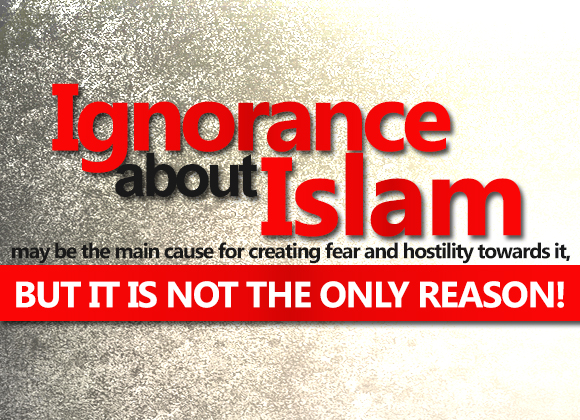
Previously, we discussed causes related to the phenomenon of Islamophobia. In this article, we will continue with other points that have played a major role in fueling this phenomenon.
3- Conflict of interests and different perspectives of value:
Despite the fact that ignorance about Islam may be the main cause for creating fear and hostility, it is not the only reason. History records that many who had knowledge about Islam feared this Divine religion equally, if not more. Islam formed a vision which the previous divine teachings constantly called for since the creation of mankind: demolish falsehood, spread justice, brotherhood, equality and virtue amongst humans.
Such projections were bound to come in conflict with the interests of many opportunistic categories which were/are keen on continuing a dysfunctional system that’s filled with exploitation, injustice and deviation.
For instance, the Jews of the Arabian Peninsula excelled in dealing with usury, prostitution and alcohol trading. They were certain of the Prophet’s ![]() truthfulness, as well as the truthfulness of his message, as according to what came in their scriptures from prophecies, but they insisted in their animosity towards Islam and plotted against it, based on their refusal to sacrifice their illegitimate gains not approved by Islam, as well as their egoistic attitude from following a messenger that did not come from them. Allah exposed their plotting and their denial of the messenger according to the prophecy which came in their own scriptures, and as mentioned in Qur’an:
truthfulness, as well as the truthfulness of his message, as according to what came in their scriptures from prophecies, but they insisted in their animosity towards Islam and plotted against it, based on their refusal to sacrifice their illegitimate gains not approved by Islam, as well as their egoistic attitude from following a messenger that did not come from them. Allah exposed their plotting and their denial of the messenger according to the prophecy which came in their own scriptures, and as mentioned in Qur’an:
“Those to whom We gave the Scripture know him as they know their own sons. But indeed, a party of them conceal the truth while they know [it].” (Albaqarah, 2:146)
Such situation also applied to numerous leaders of the Quraish and Arabs at the beginning of the call to Islam, who refused to follow the message of prophet Muhammad ![]() , not because they did not believe in it, but due to arrogance and keenness to sustain gains of leadership.
, not because they did not believe in it, but due to arrogance and keenness to sustain gains of leadership.
It was mentioned that Abu Jah,l the archenemy of Islam, when explaining his insistence in not believing the messenger of Allah ![]() and his animosity to his message, said, “I swear by Allah that I know that what he says is the truth but Bani Qasi said: ‘Are we not the gatekeepers (of Mecca)?’ We replied: ‘Yes.’ They said: ‘Do we not have a council of leaders?’ We replied: ‘Yes.’ They said: ‘Are we not united by a common bond?’ We replied: ‘Yes.’ They said: ‘Do we not provide water for the for the Mecca pilgrims?’ We replied: ‘Yes.’ Then Bani Qasi served food and we ate until when we became firmly united as if we had already mounted our fastest horses they said: ‘Is there a prophet from among us? No, by Allah I will not accept this!’”. [Albayhaqi, Signs of prophecy and his knowledge of the conditions of Sharia, Beirut: Dar Alkotob Aljame’eyah, 1985 -Arabic Edition]
and his animosity to his message, said, “I swear by Allah that I know that what he says is the truth but Bani Qasi said: ‘Are we not the gatekeepers (of Mecca)?’ We replied: ‘Yes.’ They said: ‘Do we not have a council of leaders?’ We replied: ‘Yes.’ They said: ‘Are we not united by a common bond?’ We replied: ‘Yes.’ They said: ‘Do we not provide water for the for the Mecca pilgrims?’ We replied: ‘Yes.’ Then Bani Qasi served food and we ate until when we became firmly united as if we had already mounted our fastest horses they said: ‘Is there a prophet from among us? No, by Allah I will not accept this!’”. [Albayhaqi, Signs of prophecy and his knowledge of the conditions of Sharia, Beirut: Dar Alkotob Aljame’eyah, 1985 -Arabic Edition]
In reality, the same logic applies to the Western world today, for it is known that they adopt their own behavioral methods that are mainly connected with the capitalist system and pragmatic principles which aim for maximizing profits, pleasures and private benefits.These include social and economical “freedoms” such as gambling, drinking alcohol, trading with usury, legalizing prostitution, homosexuality, allowing sexual relations out of wedlock and so on.
Certainly such behaviors is not approved by Islam which considers such behaviors forbidden acts that require criminalizing and punishment. Thus, it is natural that many of the Westerners find in Islam and its teachings a threat to what they consider basic “freedom” that should never be compromised!
Conflicts of self-interest and culture widely overlap to draw the shape of relations between Islam and the West. We can acknowledge that the conflict which governs the Western world with Islam is partially based on the deep cultural differences that is historically rooted, as claimed by the famous theory of “The Clash of Civilizations” by Samuel Huntington. It is also possible to say that an important part from that conflict is based on the conflict of interests between Islam and the West, where the latter shows a degree of acceptance to accept a “Moderate” Islam that guarantees its political and economical interests and does not form a threat to it.
4- The reality of Muslims:
It is no secret to anyone that the Muslim Ummah is suffering a bitter reality and dire straits on many levels for many centuries; politically, economically, socially and culturally, which reflects on the reasons why such a nation stands at the tail end of all the other nations when it comes to contributing in elevating humanity and its progress.
At the political level, wars and armed conflicts still reap the souls of thousands of Muslims every year, such as what happens in Palestine, Iraq, Syria, Afghanistan and Algeria to name a few. And it seems that Islamic countries are incapable to do anything to stop such conflicts, or come out victorious from them or to even settle them down, as many of the Islamic countries submit one way or another to foreign forces that confiscate their freedoms and limit their abilities for an actual independence.
At the economical level, statistics indicate that more than half a billion Muslim live under the line of poverty, which means, a third of the world’s population who live under the poverty line is from the Muslim world, despite the fact that many countries of the Islamic world enjoy massive human and natural resources. This in turn, directs the attention to the plagues of corruption, mismanagement and the disruption of justice in the distribution of resources and wealth. Not only that, but many Islamic countries are ravaged by hunger which took the lives of hundreds of thousands of its inhabitants, such as what happened in Nigeria, Somaliland and Sudan.
At the social level, we can speak about the suffering of many Islamic countries of the blatant inequalities between the different classes of the community, (which increases every year) as well as the fractures in its traditional institutional structure, coupled with the inability to newly construct the ability to have successful and effective accomplishments, not to mention the degradation of the status of women, marginalizing the role of youth, the lack of care towards children, and the shaken system of values under the pressures of invading Western values.
As for the cultural level, it seems that the Islamic world is almost completely cut off from the knowledge, information and scientific revolution that is witnessed by the world, and lacks contribution in such revolutions, whether it was on creativity or development levels, and ends up as an avid consumer, in the best of cases, to what such revolutions produce.
It becomes natural to link Islam from one side and poverty and ignorance from the other side to blame Islam for the weakness of its followers and the reasons for they falling behind. According to this, it seems unlikely that Westerners who only know this deformed image of Islam would sympathize with the religion, and it is only natural for them to take a negative and aggressive stand, due to their belief that Islam is a main reason for the backwardness of vast parts of the world, and thus assigning part of their attention to fight it and try to eradicate it.
To be continued…








3 replies on “Islamophobia: What, How and Why-Part 2”
Excellent knowledge & full of wisdom & practical tips. Jazakallah Khair. May Allah reward you in this world and the Hereafter Akhirah
Assalamu alaikom, wa khairan jazaak brother, may Allah reward you the highest stations in Jannah.
Masterly Summarized many serious issues where we have to reflect collectively … May Allah Bless You with more knowledge brother.